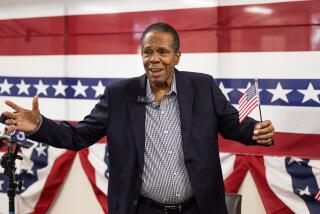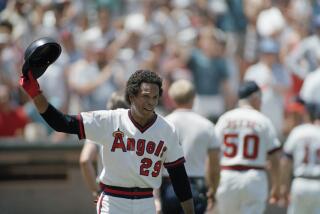Michelle Carew Succumbs to Leukemia
- Share via
ORANGE — Michelle Carew, the daughter of baseball Hall of Famer Rod Carew who waged a seven-month battle with leukemia that sparked an international outpouring of support and a surge in the pool of potential bone marrow donors, died Wednesday morning. She was 18.
Michelle died from cardiac and respiratory failure at Children’s Hospital of Orange County, with her father, her mother, Marilynn, and a cluster of friends, relatives and nurses at her bedside.
In an emotional news conference at the hospital in Orange, Carew brushed away tears as he recounted his family’s parting moments with Michelle, who had become a national symbol for people afflicted with the blood disease.
“We told her we loved her, we’re all here, and to have a safe journey,” Carew said.
Acknowledging the outpouring of support, Carew said his daughter’s death was not in vain.
“Although we have lost Michelle, we can take solace in the fact that because of [her], many lives have already been saved by the increase in marrow transplants performed in the weeks subsequent to our appeal.”
The usually taciturn Carew had pleaded for people across the country to sign up as potential donors after he saw how few African Americans and other minorities were registered in the National Marrow Donor Program.
Within a few weeks after he began a public awareness campaign Nov. 6, more than 70,000 calls to the marrow program were generated. The donor registry’s rolls recently increased to 2 million--up from 1.5 million last year--thanks in large part to the Carews’ efforts to raise awareness.
National registry officials estimate that thousands of ethnic minorities have stepped forward to become donors since the Carews’ pleas.
“That was absolutely awesome,” said Dr. Craig Howe, chief executive officer of the Minneapolis-based donor program, of the family’s action. “It’s the major initiative we have at the present time--to increase the racial diversity of the registry.”
Dr. Richard Stiehm, chief of pediatric immunology at UCLA Children’s Hospital, said Wednesday: “Hopefully, out of the tragedy of Michelle’s dying, people will realize the importance of going out and getting [their marrow] typed.”
But because of Michelle’s rare genetic composition--her father is black with West Indian and Panamanian heritage and her mother is white with Russian-Jewish roots--it was difficult to find a suitable donor.
“Being a mixed child, the percentages weren’t in her favor,” Carew said at the news conference. “She just ran out of time, just lost the battle.”
Throughout the day, condolences poured in to the family from the baseball world.
“This is a tragedy for all of us within the organization. Today, a member of the Angels’ family passed away,” said Angels President Richard M. Brown.
Rod Carew played the last seven years of his career with the Angels and has been on a leave of absence as the team’s hitting instructor.
“Words are hard to come by,” Angels owner Gene Autry said in a statement. “Michelle was a fighter throughout her entire illness. She displayed an immense amount of courage.”
Last month, Michelle underwent a rare umbilical cord blood transplant, a new therapy for the treatment of leukemia and other cancers that doctors hoped would reinvigorate her immune system. The procedure involved transplanting into Michelle cells from a newborn’s umbilical cord to stimulate production of normal blood cells.
Before the procedure, which has about a 50% success rate, Michelle received heavy doses of chemotherapy, which kills cancer cells but weakens the immune system, leaving her susceptible to infections and other complications.
Although Michelle was in remission for about three months during the winter and was strong enough to come home from the hospital for about four hours a day, she took a dramatic turn for the worse early this month after the cord-blood transplant. Michelle suffered kidney failure and was put on dialysis.
Dr. Mitchell Cairo, Michelle’s doctor and director of Children’s Hospital’s blood and bone marrow transplantation program, said Wednesday the teenager died from cardiac and respiratory failure--complications linked to leukemia therapy.
Cairo said chemotherapy had sapped Michelle’s strength and robbed her of the opportunity to enjoy “the fruits” of the cord-blood transplant.
Because she had battled back from health setbacks several times before, Michelle’s death came as a shock to nurses and other hospital officials.
Some hospital personnel sobbed and exchanged comforting hugs during the news conference. “She was the comeback kid,” said Larissa Murphy, the hospital’s transplant coordinator. “We never thought that this would happen. This is very hard.”
Michele Millerick, coordinator of the hospital’s bone marrow program, said Michelle inspired other patients and hospital staff.
“She would always encourage us to go ahead with the publicity for more bone marrow donors,” Millerick said. “But she wanted it for other patients, not just herself. Everyone talked about her selflessness.”
At Canyon High School in Anaheim Hills, where Michelle graduated last year, some students broke down in tears after student body President David Anderson announced her death over the school’s closed-circuit TV system.
Kristie Hiatt, who played with Michelle on the Canyon High Comanches softball team, said: “Even with all of her [health problems] she never gave up. She always came up to bat with a smile on her face. She always picked everyone up.”
Lance Eddy, Michelle’s softball coach and math teacher, said Michelle’s allergic reaction to grass and dust limited her to being a designated hitter for the team. “She used to hit some monster shots,” Eddy said. “She had the Carew hitting eye--she was a hitter.”
Carew, whose family has spent the last seven months in a motor home parked behind the hospital, thanked Cairo, the nurses and other hospital staff for their support.
“I don’t know how they do it,” Carew remarked about the hospital staff. “You talk about heroes? There are a lot of heroes up there. They cared for her just like they cared for any other child on that floor.”
Carew also thanked the media--more than two dozen journalists attended the news conference--for publicizing the family’s plea for more potential bone marrow donors.
“You’ve put some light on this,” Carew said. “Hopefully, we’ve saved some lives.”
Michelle’s condition was diagnosed as acute nonlymphocytic leukemia, one of the most aggressive and deadly strains of the disease, in the fall of 1995.
She was writing a paper for a Cypress College freshman English class on Sept. 10 when her mother found her slumped over her computer, complaining of a headache, back pains and blurred vision.
Within days of the subsequent diagnosis, Michelle began an extensive chemotherapy program as doctors searched for a donor who could provide life-giving bone marrow.
In a sad irony, Carew’s other two daughters, Charryse, 22, and Stephanie, 20, were a perfect match for each other, but not for Michelle.
Carew appeared on several national television programs and granted in-depth interviews to many newspapers. He even stopped strangers on the street, handing them business cards with the phone number for the marrow program. He wrote to Abigail Van Buren, who printed Carew’s plea in her syndicated column.
The response was overwhelming. Letters poured in from all over the world. People sent good-luck charms and well wishes.
Numerous bone marrow donor drives were organized in Southern California. There were calls from as far away as France, with tips on possible donor candidates. An inmate serving his 20th year in federal prison wrote to the Carews, offering to be tested.
“She became more famous than her dad,” the Hall of Famer said Wednesday, managing a smile.
Times staff writer Rene Tawa and correspondent Alan Eyerly contributed to this story.
More to Read
Sign up for Essential California
The most important California stories and recommendations in your inbox every morning.
You may occasionally receive promotional content from the Los Angeles Times.














